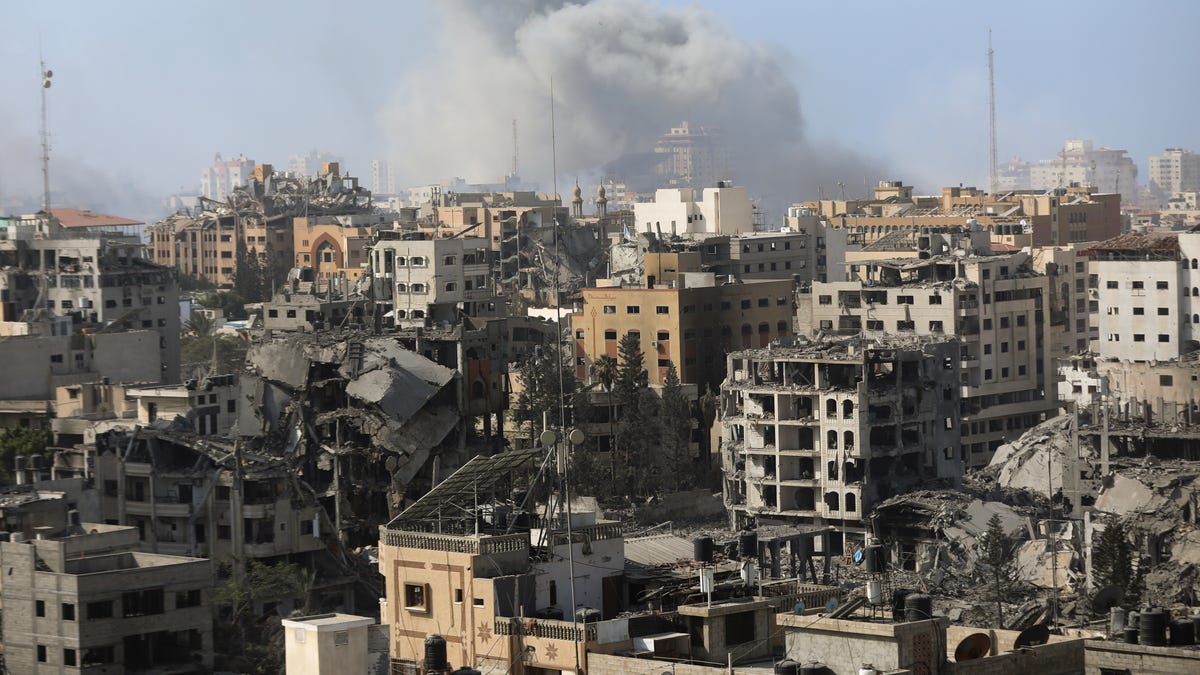
Israel open to humanitarian pause, but rejects calls for a cease-fire
Prime Minister Benjamin Netanyahu opposes a cease-fire in Gaza as long as Hamas holds Israeli hostages, but he is open to a humanitarian pause.
In a crucial breakthrough for the global effort to provide humanitarian aid to Gaza, Israel has agreed to daily, four-hour pauses in fighting across northern Gaza, the White House said Thursday.
U.S. National Security Council spokesman John Kirby said the Israelis had committed to announcing each four-hour window at least three hours in advance starting Thursday. Israel also was opening a second corridor for civilians to flee the areas being pounded by Israel’s military campaign aimed at wiping out Hamas after the brutal Oct. 7 attack on border communities, with a coastal road joining the territory’s main north-south highway, he said.
Pauses in the fighting have been taking place intermittently for days while tens of thousands of civilians flee northern Gaza for the south. The U.S. and several other nations have been urging Israel to provide more time for safe passage and for the safe flow of humanitarian aid into war-battered Gaza.
Kirby also said the pauses could help the effort to win freedom for at least some of the approximately 240 hostages, including several Americans, held by Hamas and other militants since the war began. President Joe Biden told reporters he asked the Israelis for a “pause longer than three days” in talks about freeing the hostages.
US fighter jets strike Syria: Hit militia’s facility in response to attacks
Developments:
∎ An Israeli fighter jet killed Ibrahim Abu-Maghsib, head of Hamas’ Anti-Tank Missile Unit, the Israeli military said. Maghsib directed and carried out numerous anti-tank missile launches directed at Israeli civilians and soldiers, the military said.
∎ Israel said 32 of its soldiers have been killed in Gaza since the ground offensive began two weeks ago.
∎ An estimated 250,000 Israelis have been forced to evacuate from communities near Gaza and Lebanon, where Israeli forces and Hezbollah militants have clashed.
∎ Western and Arab officials gathered in Paris on Thursday to discuss ways of providing more aid to civilians in Gaza. The talks come one day after the Group of Seven democracies called for the unimpeded delivery of food, water, medicine and fuel, as well as humanitarian pauses in fighting.
The Palestinian Authority is willing to rule the Gaza Strip after the war if the United States commits to a two-state solution to end the Israeli-Palestinian conflict, a top official of the Palestine Liberation Organization told the New York Times. Hussein al-Sheikh, the PLO’s secretary general, said he told Secretary of State Antony Blinken last week that the Palestinian Authority sought a comprehensive political agreement that would include the Gaza Strip, the West Bank and East Jerusalem. Al-Sheikh said Palestinian leaders believe the Biden administration is capable of forcing Israel to go along.
U.S. officials say the Palestinian Authority, which rules the West Bank, must play a central role in Gaza after Hamas is destroyed. Hamas has ruled Gaza since 2007.
Al-Sheikh warned that without a comprehensive initiative from the U.S. postwar, Gaza would be “a fertile soil for radicalism.”
Mediators were closing in on a possible deal for a three-day cease-fire in exchange for the release of about a dozen hostages held by Hamas, two Egyptian officials, a U.N. official and a Western diplomat told the Associated Press. The deal would also allow fuel to enter Gaza for the first time since the war began.
Militants are believed to be holding about 240 hostages, most of them Israelis. They were seized Oct. 7 when militants crashed across the border from Gaza and rampaged through Israeli communities, killing 1,400 and wounding thousands more. That fueled an Israeli push to crush Hamas, with the resulting attacks blamed for more than 10,800 Palestinian deaths, according to the Gaza Health Ministry.
Israeli strikes pounded Gaza City on Thursday while ground forces clashed with Hamas militants near a hospital where the Israelis say Palestinian civilians are being used as ”human shields.” The Israeli military, facing global backlash for its unrelenting destruction of Gaza, accused Hamas of exploiting hospitals, ambulances, clinics, mosques and schools to stash militants and weapons. Israeli forces were closing in on Gaza’s largest hospital, al-Shifa, where tens of thousands of Palestinian civilians reportedly are sheltering alongside patients.
One militant captured by Israel reportedly said ambulances were used to transport “important people” such as Hamas commanders because “the Jews don’t attack ambulances,” according to a translation by the Times of Israel.
“Most senior Hamas political and military officials are hiding in the hospitals, especially the Shifa Hospital,” the Israeli military said in a statement. “This is another example of how the Hamas terrorist organization exploits civilian infrastructure and uses civilians as human shields.”
The arrest of six prominent Palestinian leaders on their way to an antiwar protest in Israel has prompted accusations the Israeli government is trying to quash dissent.
Among those detained were three former lawmakers: Mohammed Barakeh, Hanin Zoabi and Sami Abou Shahadeh.
The Adalah organization, which advocates for the rights of Palestinians in Israel, said Barakeh was arrested illegally after being followed by police. He explained the group he leads planned a protest with less than 50 participants and did not require a permit.
His detainment, Adalah said, exemplifies a policy “designed to muzzle any dissent and to suppress the freedom to protest of Arab-Palestinian citizens of Israel.”
With about 20% of Israel’s population of 9.7 million, Arabs represent the country’s biggest minority.
Police said in a statement the protest in the northern city of Nazareth was “liable to incite and harm the public’s welfare.” Police recently banned antiwar protests.
German Chancellor Olaf Scholz marked the 85th anniversary of Nazi-fueled Kristallnacht riots that left more than 100 Jews dead by vowing Thursday to protect German Jews from a “shameful” surge in antisemitism. Scores of synagogues were burned, hundreds of Jewish businesses were destroyed and homes were ransacked on “Crystal Night,” which later became known as the “Night of Broken Glass.”
Germany, like many other countries, has seen an uptick in antisemitism violence since the Israel-Hamas war broke out. Scholz attended a memorial event in Berlin’s Beth Zion Synagogue, attacked last month in a failed arson attempt. Germany’s “never again” promise made after World War II means the country must protect Jewish institutions and communities, he said.
“The Hitler Putsch (coup) began in Munich 100 years ago this evening,” Scholz wrote on social media. “Our lesson: We must protect and defend our democracy against anyone who wants to undermine it. This applies to each and every one of us and especially these days.”
Contributing: The Associated Press

Abhinav Thawait is a globe-trotting correspondent with a passion for international affairs. With a background in international relations, he offers a global perspective on the most pressing issues around the world. Abhinav’s curiosity takes his to the far corners of the earth, where he seeks to share untold stories and diverse viewpoints.








